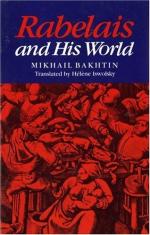
|
| Name: _________________________ | Period: ___________________ |
This quiz consists of 5 multiple choice and 5 short answer questions through Chapter 4, Chapter 2 - The Language of the Marketplace.
Multiple Choice Questions
1. How, according to Bakhtin, does the current Russian literary criticism approach Rabelais' works?
(a) By trying to correctly interpret the source of the cultural laughter within them.
(b) By reviving their content in new, twentieth-century forms.
(c) By denouncing them as counterproductive to the ongoing Russian Revolution.
(d) By sharing them with an eager public.
2. Why are Rabelais' billingsgate elements considered "coarse and cynical" by most scholars?
(a) These elements express a deep distrust of contemporary society.
(b) Many scholars interpret them only in a modern context.
(c) The Latin derivations of his scatological vocabulary mean "cynical."
(d) Many scholars believe that Rabelais himself was bitter from publication disputes.
3. In Rabelais' time, why was the meaning of debasement often ambivalent?
(a) Because the head is quite separate from all the other parts of the body, spiritually and materially.
(b) Because the decaying or excretory organs are closely located to the regenerative genital organs.
(c) Because the person saying the insult never means it seriously.
(d) Because the debased person may choose to deflect the debasement.
4. Why was Rabelais linked so closely to the Lyon fairs?
(a) Rabelais was a performing clown for several years in these fairs.
(b) Rabelais was a chief organizer of these fairs.
(c) The organizers of the fairs in Lyon banned Rabelais from attending them.
(d) Lyon fairs represented one of the largest markets for publishing.
5. According to Bakhtin, what is the function of art?
(a) To glorify the artist.
(b) To be beautiful in and of itself.
(c) To communicate meaningful messages.
(d) To be sold for money or services.
Short Answer Questions
1. How are Bakhtin and Rabelais similar?
2. When the grotesque was revived in the Romantic era, what did it react against?
3. Bakhtin thinks that life is:
4. Comic rituals in Medieval and Renaissance Europe were:
5. Did the "unofficial" and "official" forms of speech ever coincide?
|
This section contains 417 words (approx. 2 pages at 300 words per page) |

|




